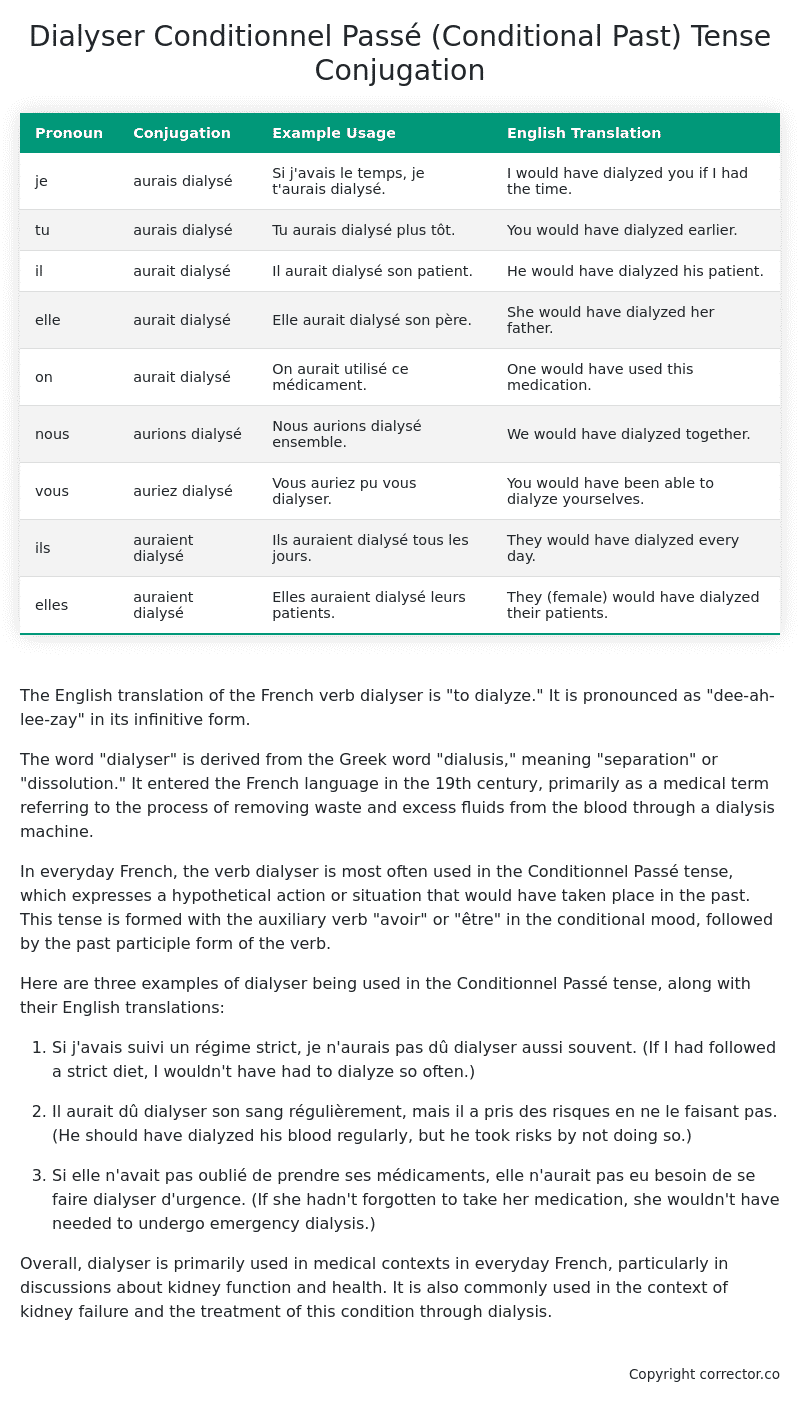Conditionnel Passé (Conditional Past) Tense Conjugation of the French Verb dialyser
Introduction to the verb dialyser
The English translation of the French verb dialyser is “to dialyze.” It is pronounced as “dee-ah-lee-zay” in its infinitive form.
The word “dialyser” is derived from the Greek word “dialusis,” meaning “separation” or “dissolution.” It entered the French language in the 19th century, primarily as a medical term referring to the process of removing waste and excess fluids from the blood through a dialysis machine.
In everyday French, the verb dialyser is most often used in the Conditionnel Passé tense, which expresses a hypothetical action or situation that would have taken place in the past. This tense is formed with the auxiliary verb “avoir” or “être” in the conditional mood, followed by the past participle form of the verb.
Here are three examples of dialyser being used in the Conditionnel Passé tense, along with their English translations:
-
Si j’avais suivi un régime strict, je n’aurais pas dû dialyser aussi souvent. (If I had followed a strict diet, I wouldn’t have had to dialyze so often.)
-
Il aurait dû dialyser son sang régulièrement, mais il a pris des risques en ne le faisant pas. (He should have dialyzed his blood regularly, but he took risks by not doing so.)
-
Si elle n’avait pas oublié de prendre ses médicaments, elle n’aurait pas eu besoin de se faire dialyser d’urgence. (If she hadn’t forgotten to take her medication, she wouldn’t have needed to undergo emergency dialysis.)
Overall, dialyser is primarily used in medical contexts in everyday French, particularly in discussions about kidney function and health. It is also commonly used in the context of kidney failure and the treatment of this condition through dialysis.
Table of the Conditionnel Passé (Conditional Past) Tense Conjugation of dialyser
| Pronoun | Conjugation | Example Usage | English Translation |
|---|---|---|---|
| je | aurais dialysé | Si j’avais le temps, je t’aurais dialysé. | I would have dialyzed you if I had the time. |
| tu | aurais dialysé | Tu aurais dialysé plus tôt. | You would have dialyzed earlier. |
| il | aurait dialysé | Il aurait dialysé son patient. | He would have dialyzed his patient. |
| elle | aurait dialysé | Elle aurait dialysé son père. | She would have dialyzed her father. |
| on | aurait dialysé | On aurait utilisé ce médicament. | One would have used this medication. |
| nous | aurions dialysé | Nous aurions dialysé ensemble. | We would have dialyzed together. |
| vous | auriez dialysé | Vous auriez pu vous dialyser. | You would have been able to dialyze yourselves. |
| ils | auraient dialysé | Ils auraient dialysé tous les jours. | They would have dialyzed every day. |
| elles | auraient dialysé | Elles auraient dialysé leurs patients. | They (female) would have dialyzed their patients. |
Other Conjugations for Dialyser.
Le Present (Present Tense) Conjugation of the French Verb dialyser
Imparfait (Imperfect) Tense Conjugation of the French Verb dialyser
Passé Simple (Simple Past) Tense Conjugation of the French Verb dialyser
Passé Composé (Present Perfect) Tense Conjugation of the French Verb dialyser
Futur Simple (Simple Future) Tense Conjugation of the French Verb dialyser
Futur Proche (Near Future) Tense Conjugation of the French Verb dialyser
Plus-que-parfait (Pluperfect) Tense Conjugation of the French Verb dialyser
Passé Antérieur (Past Anterior) Tense Conjugation of the French Verb dialyser
Futur Antérieur (Future Anterior) Tense Conjugation of the French Verb dialyser
Subjonctif Présent (Subjunctive Present) Tense Conjugation of the French Verb dialyser
Subjonctif Passé (Subjunctive Past) Tense Conjugation of the French Verb dialyser
Subjonctif Imparfait (Subjunctive Imperfect) Tense Conjugation of the French Verb dialyser
Subjonctif Plus-que-parfait (Subjunctive Pluperfect) Tense Conjugation of the French Verb dialyser
Conditionnel Présent (Conditional Present) Tense Conjugation of the French Verb dialyser
Conditionnel Passé (Conditional Past) Tense Conjugation of the French Verb dialyser (this article)
L’impératif Présent (Imperative Present) Tense Conjugation of the French Verb dialyser
L’infinitif Présent (Infinitive Present) Tense Conjugation of the French Verb dialyser
Struggling with French verbs or the language in general? Why not use our free French Grammar Checker – no registration required!
Get a FREE Download Study Sheet of this Conjugation 🔥
Simply right click the image below, click “save image” and get your free reference for the dialyser Conditionnel Passé tense conjugation!

Dialyser – About the French Conditionnel Passé (Conditional Past) Tense
Formation
Common Everyday Usage Patterns
Expressing Unreal Past Scenarios
Polite Requests or Suggestions
Expressing Doubt or Uncertainty
Interactions with Other Tenses
Conditional Present
Indicative Past Tenses
Conditional Future
Summary
Want More?
I hope you enjoyed this article on the verb dialyser. Still in a learning mood? Check out another TOTALLY random French verb conjugation!


